It’s easy to lose your digital money if you are not consciously doing things.
Unfortunately, in the world of Bitcoin and other cryptocurrencies, incidents such as Bitfinex or MtGox are nothing new.
Also, there have been some reported incidents where an individual has lost his/her coins and the reason was that he/she lost access to their private keys.
How to make Bitcoin more secure and avoid such losses? I know this is a big question in everybody’s mind…
That’s the reason why more and more people are looking out for more secure ways to store their Bitcoins. And why not? Bitcoin is becoming more and more precious each day, and at the time of writing this article, Bitcoin is trading at about $10000.
Standard Bitcoin transactions only require one signature (i.e. single private key through which an individual can sign and verify a transaction). It may look like single keys give full autonomy to the owner of the funds. However, in reality, this is very risky because this single signer system puts a lot of power in one little string of alphanumeric numbers (i.e. your private key).
What if your key is stolen or you have misplaced it?
Then you will lose your funds.
However, these situations can be avoided by using multisignature addresses or wallets instead of traditional wallets.
What you'll learn 👉
What is a Multisignature Wallet?
Multisignature (multisig) refers to requiring more than one key to authorize a Bitcoin transaction, and is generally used to divide up responsibility for possession of Bitcoins.
Standard Bitcoin transactions could be called “single-signature transactions,” because they only require one signature – from the owner of the private key associated with the Bitcoin address. However, the Bitcoin network supports much more complicated transactions. These transactions require the signatures of multiple people before the funds can be transferred, and they are often referred to as M-of-N transactions.
This multisig technology is what fuels multisignature wallets (aka multisig wallets) and makes all cryptocurrencies ultra safe and secure.
Bitcoin multisignature addresses typically have 3 associated private keys, although they can have up to 15. The idea is that by providing addresses of multiple parties Bitcoins become “encumbered,” thus requiring the cooperation of separate parties in order to do anything with them. 2 out of 3 key holders need to authorize a transaction in a typical multisig situation.
A multisig wallet may not be the best choice for every bitcoin user. However, when security is the primary concern, there simply isn’t a substitute. They allow individual users to implement two-factor authentication (2FA). In this situation, one key is on your primary computer and a second is on your Smartphone. This means that the funds cannot be spent without a signature from both devices. They also let 2 people from the same business complete a third-party payment. In this situation, one person generates a transaction while a second authorizes the payment.
P2SH.info keeps track of the number of Bitcoins being held in ‚pay to script hash‘ addresses. This accounts for most of the multisignature addresses is use. According to the service, around 10% of all Bitcoins (1.5 Million Bitcoins today) are currently being held in multisignature wallet, which means that only 10% of all existing Bitcoins are being secured as well as they could be. If you aren’t one of those 10, and you’ve got a large stash of coins, it may be time for you to choose one of the many wallets that provide multisig security.
The following 13 wallets are the only ones we could find today that offer multisignature addresses, and they all have differing features, because they seem to solve slightly different issues. This means that it’s worth taking your time when picking one.
mSigna and Armory assume that without a local copy of the whole blockchain, you aren’t as safe as you can be. This is true for a very specific type of attack. However, it’s over 50 GB in size, and keeping it up to date means running the local machine 24/7. Other wallet makers vary in how they remotely sign transactions. On the other hand, some wallets don’t sign it at all, giving you all of the keys. That’s why it’s very important to consider each of these differences carefully.
Top 13 Best Multisignature Wallets
Armory

Developed way back in mid-2011, Armory is the original high-security wallet. In this wallet users control their private keys without relying on Armory or any third party servers. It has many unique features. However, they can be more than a little overbearing for beginner users. It is an open-source wallet with cold storage and multi-signature support, and it requires a local copy of the blockchain to be on the same machine. It allows users to create multisig addresses with its Lockboxes feature, and it specializes in splitting your wallet in two. The ‚watch-only‘ wallet has no private keys inside it. On the other hand, the ‚cold wallet‘ is intended to live on a different computer that never goes online.
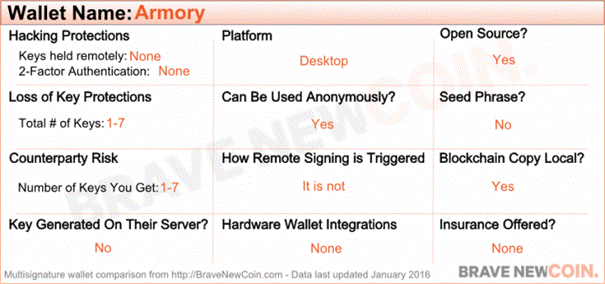
There is no web portal nor signing service with Armory, but the wallet provides up to 7-of-7 authorizers to sign a Bitcoin transaction. It’s also the only wallet on this list to help you make paper wallets, for storing your coins totally on paper, even multiple pieces of paper for multisignature wallets, and it’s the perfect wallet if you are an exchange or a group of stake holders in a community or a startup.
Armory is currently available for Linux, Mac OSX, and Windows.
BitGo

BitGo is one of the very largest wallet providers no matter how you measure and they have been taking care of Bitcoin funds since 2013. BitGo is a popular Bitcoin wallet that supports multi-signature functionality and provides up to 3-of-3 authorizers to sign a Bitcoin transaction. It’s important to note that they also offer free insurance to all users in case of a hack.
You may find yourself using a BitGo wallet without even knowing it, because they are the only wallet on this list that integrates into third-party bitcoin exchanges like ShapeShift, UnoCoin, Kraken, BitQuick, Bitstamp, BitBay, and Bitfinex. You can even integrate your multisig addresses with BitGo along with the Ledger Blue and Ledger Nano S hardware wallets.
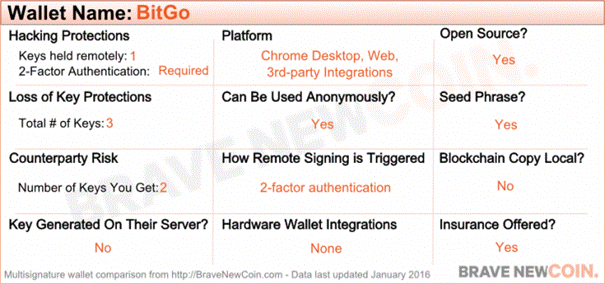
BitGo is currently available for Linux, Mac OSX, Windows, Chrome Extension, iOS, and Android.
Bitalo

Bitalo is one of the least-known services on this list. This is a web-only wallet. Its lack of an open-source software client likely scares away quite a few of the security purists. However, Bitalo comes with a full suite of adjoined services like an exchange, mining pool, classifieds, market place, and even a prediction market – which are all integrated with your wallet service on their site.
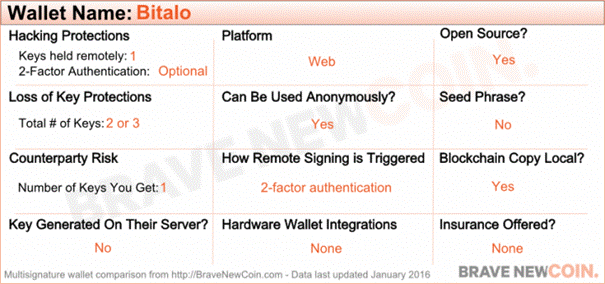
Bitalo also allows for an optional 2-factor authentication (2FA). However, if you don’t turn it on you won’t have any way for them to sign their key for you. This means that this is a necessity when dealing with multiple keys.
Coinbase

Coinbase is by far the most popular wallet on the list. Coinbase is more than a wallet service, it’s like an exchange and bank all rolled into one, with local websites and bank connections in 30 countries all around the world.
Coinbase is a hosted wallet, which means that Coinbase controls your private keys on your behalf. However, it also provides non-hosted multisig wallets whereby you control your own private keys.
There is no such thing as anonymity while using Coinbase. Also, their client code is not open source in any way. They normally offer Insurance to their customers. However, in the case of Multisignature “vaults” as they call them, they don’t offer insurance anymore because they don’t have full control over your coins that way. They do offer some interesting combinations for their multisignature addresses though. For example, Coinbase uses a 3-key architecture (i.e. Coinbase key, user key, and shared key) to provide you the control of your funds, and it also provides up to 3-of-3 authorizers to sign a Bitcoin transaction.
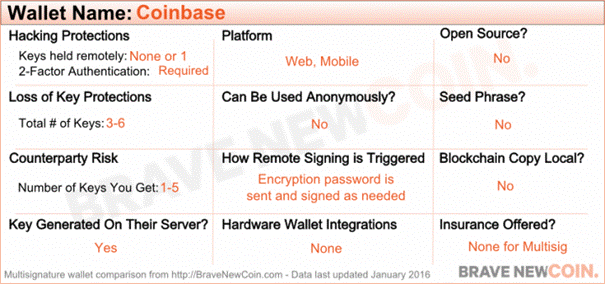
The best reason to use Coinbase would be for the convenience of using their Shift debit card. However, it does not appear that the Shift card will spend coins from a multisignature vault, only a normal wallet inside your Coinbase account.
Blocktrail

Blocktrail is a popular mobile wallet that features unparalleled security through Multisignature technology, keeping you in full control of your coins at all time. This wallet has a pretty, open source phone app that keeps one key and gives you two, so you can back one up off the phone and have full control when you need it. 2FA is optional.
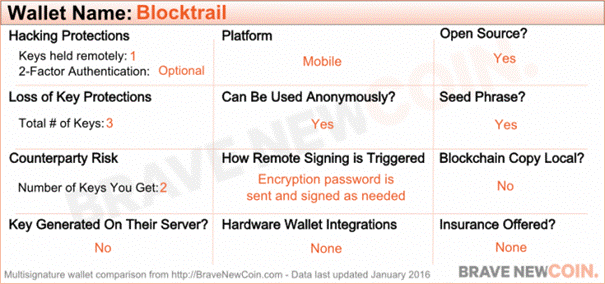
When it’s time to spend some coins on Blocktrail, it sends your one signed key and then a password to them. This password unlocks your encrypted key that they’re holding onto, on the server, just for the one spend. That way they never really have any of your keys. However, they hold onto one that is encrypted from them. This can be very secure. However, it relies on you remembering a password for this extra layer of security.
Blocktrail was acquired by Bitmain on July 19, 2016 and subsequently has re-branded to BTC.com
Block.io

Block.io is a simple web-only wallet that has a very well-developed API for programmers. This wallet also holds a few other altcoins like Litecoin and Doge. Unfortunately, they don’t allow you to generate your own private keys locally, nor offer an open source client.
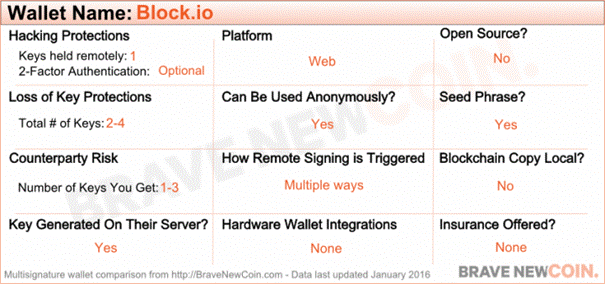
Block.io uses ‚Green Addressing,‘ which is a way to build up a sort of white list for familiar bitcoin addresses. If you’re a repeat sender, this will save you money. Nothing has been proven wrong about this practice. However, there have been many criticisms about green addressing over the years. Also, some users have pointed to the fact that many services in the past that used it, including Mt.Gox, are now out of business.
Electrum

Electrum is the most popular desktop-only wallet and it supports cold storage and multi-signature features. It is an open source project released under an MIT license, which means that anyone can run a Bitcoin node with Electrum, and there is no single point of failure. Electrum is the first to use Simple Payment Verification (SPV) as described by Satoshi in his whitepaper. That means that it only downloads the header for each block, which doesn’t take long at all. This means that this wallet is more secure than a web wallet while being almost as fast to use.
This high-privacy wallet has been constantly developed since 2011 and has a reputation as the wallet of choice for the dark web. It’s also enjoyed a huge following ever since before it was included as the standard privacy wallet on all Tails installs.
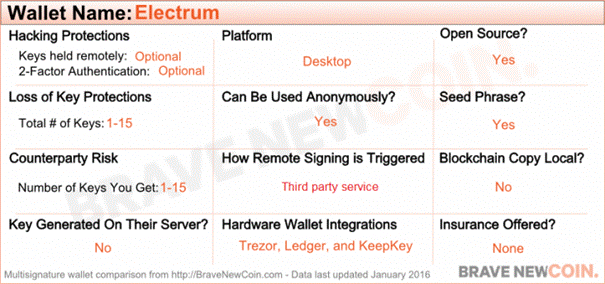
Electrum has the most hardware wallets integrated of all wallets, and it’s also the only desktop-only client software that uses a 3rd-party service for key signing. It also supports integration with third party hardware wallets such as KeepKey, TREZOR, and Ledger.
TrustedCoin is a service provider that has been integrated into the software. This means that you can optionally choose a specific but powerful level of security. They call this two-factor authorization (2FA). However, it’s actually an instance of a 2-of-3 key multisignature wallet where TrustedCoin holds the 3rd key, you hold the other two, and they charge you a tiny fee to spend with them each time.
Electrum is currently available for Linux, Windows, Android, and Mac OSX.
Copay

Copay is a simple but very well-built wallet that supports multi-signature addresses to secure your funds. This wallet was developed specifically for multisignature use by the BitPay development team. It is available on many different platforms, and you can build and use up to 6-of-6 address wallets. They’ve already integrated the Ledger and TREZOR hardware into Copay already. Here, there are no hidden or third party servers and you are in charge of your private keys. Copay is the first of its kind that also provides testnets both on iOS and Android. This means that you can first try how your multisig wallet is working.
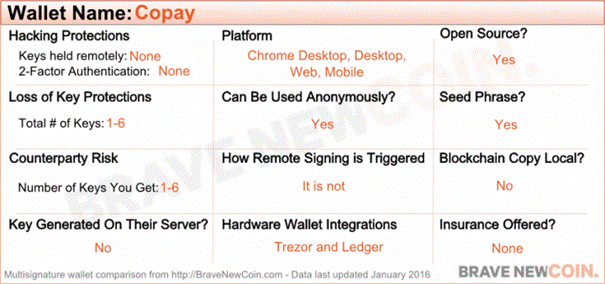
They have added secure payment verification to these sleek little wallets. This means that, while moving your funds, there is less reason to fear losing them by sending them to the wrong address.
Copay is currently available for Linux, Windows, Android, Chrome Extension, iOS, and Mac OSX.
Read also:
Coinkite
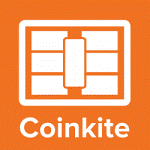
Coinkite is powerful and easy to use web wallet. This unique wallet has the most options to experiment with, a powerful API and even tools and hardware for merchants. Starting with their integration with the Ledger hardware wallet, to their ability to go all the way up to a 15-of-15 multisignature wallet, you can make a very safe and full-featured wallet with Coinkite.
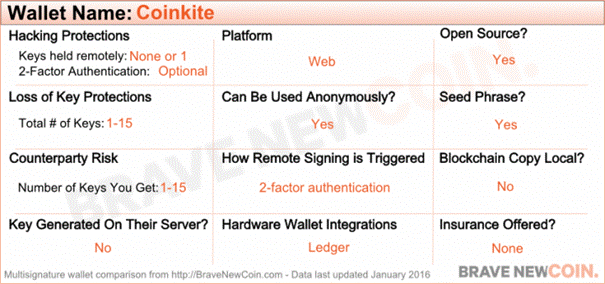
Coinkite is only a web-based wallet. However, numerous options on their website and the helpful company built around it make it seem like a full enterprise solution, even just for an individual’s wallet.
Xapo

Xapo is another popular bitcoin bank, and it is one of only two wallets on our list that offers insurance on a multisignature wallet account. Xapo is similar to Coinbase, and therefore needs your full identification.
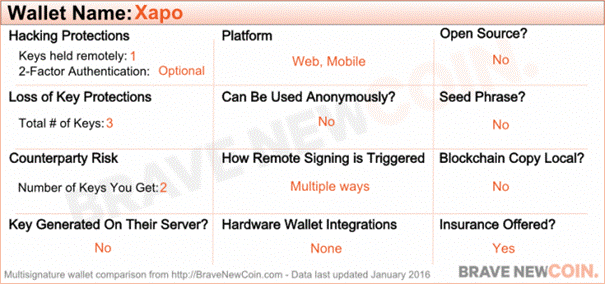
There are many different trigger choices for initiating a spend. However, multisig wallets are limited to only 2-of-3 keys. It’s important to note that a Xapo debit card is also available, like Coinbases‘ Shift card. But the problem is that this card can’t be shipped to US residents.
QuickWallet

Huobi’s QuickWallet is the only wallet here that requires using Google Authenticator in order to have their key sign your transactions. This makes the service less anonymous because Google needs a phone number for that service.
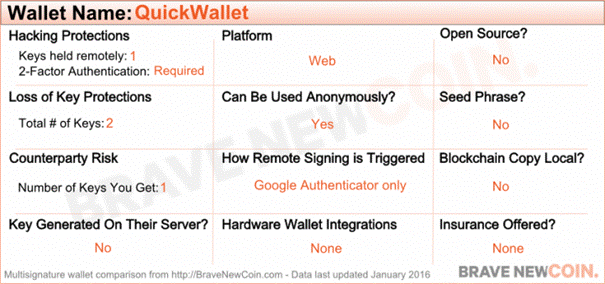
This wallet is mainly only popular in China. However, it also offers an English version that has some strong features. This web-only wallet doesn’t appear to have made its code open-source anywhere. However, it may have been programmed in Chinese and simply difficult to find.
mSIGNA
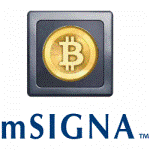
mSIGNA is the other ‚old school‘ desktop-only wallet that uses a local blockchain, much like Armory does, but unlike Armory, you can generate a seed phrase to backup your wallet in a different way if needed. This advanced yet easy-to-use wallet lets you make up to 8-of-8 key multisignature wallets.
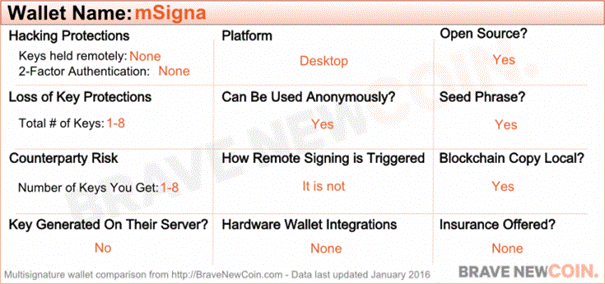
The local blockchain appears to be an optional setting however. Also, opening up the mSIGNA client can be a very speedy for a local software client.

GreenAddress is a popular multisig web wallet that has some great features. It’s the only wallet that has been developed for every major platform. This means that it’s optimized for whatever device you’re using now. It’s also got the widest array of customizable ‚triggers‘. They tell the software when it’s ok to sign your transaction with their remote key.
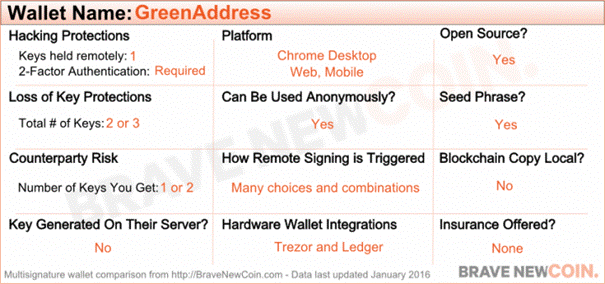
As their name implies, they use green addresses to help save on your transaction fee costs, which can be a mixed blessing, but so far this wallet is building up quite a following. It has even spun off a colored-coin wallet called GreenBits. With hardware support for both the TREZOR and the Ledger, no other best multisig wallets currently available on the market come as well-rounded as this one does.
GreenAddress wallet is currently available for Chrome, iOS, and Android.
Conclusion – Best Multisig Wallet 2021
Multisignature wallets make it easier to share control of Bitcoins between multiple parties, and they all work on the same model of sharing the addresses/private keys. However, your funds can’t be accessed with just one key so you need not to worry.
A multi-signature wallet will always require M-of-N signatures in order for funds to be spend. For example, if you have a 2-3 multisig wallet, then two of the three co-signers must sign each transaction.






